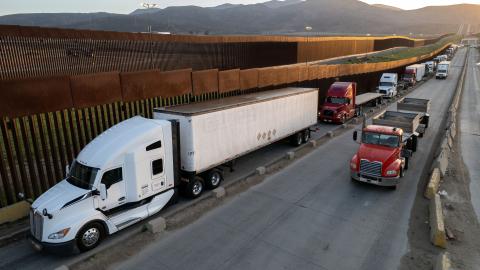There are few miseries more widely felt than the pains of sitting in traffic. Daily, millions of commuters take to overused, often poorly maintained roads and head towards their many destinations. While congested roads may seem like an unavoidable constant of life—and to some extent they are—a new study from the nonpartisan think tank Common Good suggests that a considerable amount of this inefficiency is the result of an over-complicated process for the approval of new projects. From the WSJ
In 2009 the Obama Administration air-dropped $800 billion of taxpayer cash known as the stimulus package, but as of last year a piddling $30 billion had been spent on transportation infrastructure. One reason the projects proved not as “shovel ready” as promised is that proposals must undergo extensive environmental and permitting reviews, which leave no tedium behind in part to avoid litigation. […]
One irony is that delays mean more carbon energy use. Roughly 6% of energy pumped out for public consumption is wasted thanks to America’s superannuated electricity grid. That works out to about 200 coal-burning power plants, the study notes. The same is true for congested roads, on which motorists guzzle gas in traffic while they wait the average six years for a major highway project to be approved.
The expense adds up: A six-year delay on public projects costs more than $3.7 trillion, the report found. By the way, the amount needed to update dilapidated bridges, water pipes and so on over the next decade is half that, at $1.7 trillion.
Reform of the licensing process for infrastructure projects is a vital part of the restructuring government needs. Layers of conflicting mandates, bureaucracies with overlapping responsibilities, and legal and regulatory processes that are sluggish and out of date make necessary projects and repairs slower and much more expensive than they need to be.
But this is just one window into the many ways that our government processes and bureaucratic institutions are too slow—and how this inefficiency imposes huge costs. Private business faces the same kinds of delays and obstruction when it comes to permits and clearances.
The gap between the performance we need and the performance we have is particularly frustrating because if there is one thing the information revolution ought to be able to accomplish, it is the acceleration of government decision and permit processes. Bureaucracy is best understood as an early and primitive form of computational system, using the equivalent of algorithms to analyze particular requests and actions. Law courts work much the same way.
What we call the ‘rule of law’ is the rigorous application of legal and regulatory norms to particular cases: much (though never all) of this can be done in the 21st century more effectively (faster, cheaper, fairer) by processes that take advantage of the enormous ability of information technology to accelerate the processes of analysis that bureaucracies grind through so slowly and painfully—and with so many places where bribes and political cronyism can be brought to bear.
Our society is inevitably getting more complicated: the population is growing and the complexity of modern life create denser and denser networks of overlapping interests and concerns that require ever more complex legal and regulatory systems to adjudicate and manage. That is all the more reason why we have to take up the task of upgrading the way our legal and regulatory systems work. Otherwise, American society will strangle in red tape.
















